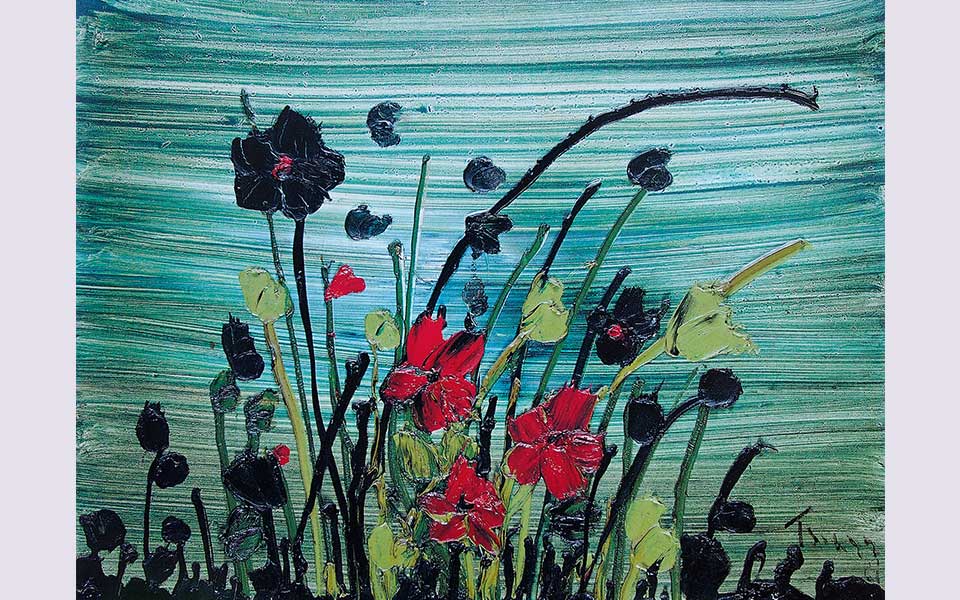Top: “Red and Black Poppies,” 1961, oil on canvas, from the publication “Greek Art: Painting in the 20th Century,” Ekdothike Athenon)
Thanos Tsingos (1914-1965), one of the first international proponents of Art Informel, had a particular fondness for flowers, depicting them with feverish brushstrokes and with a particular emphasis on materiality that characterizes all his work.
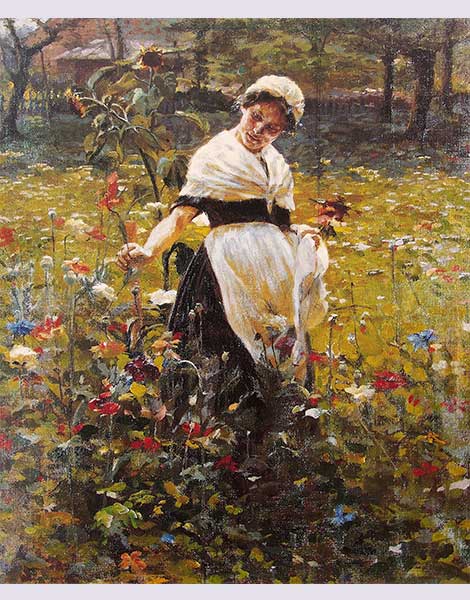
“Color Study,” 1910, oil on canvas, 60x50cm, from the publication “National Gallery: 100 Years”
Symeon Savvidis (1859-1927) engaged in an intensive study of color, and the landscapes that dominated his artistic output were helpful in allowing him to put his theories regarding color and light to the test.
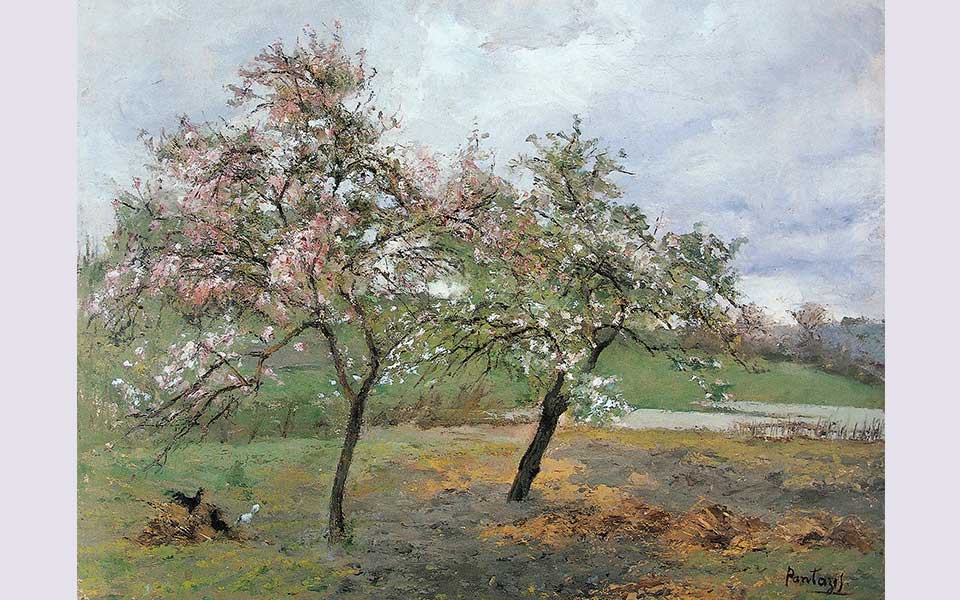
“May,” Unknown date, oil on canvas, 41x55cm, from the publication “Pericles Pantazis,” Evangelos Averoff-Tossizza Foundation
Pericles Pantazis (1849-1884) spent much of his short life in Belgium, where he was a member of the artistic group Les XX alongside notables that included Guillaime Vogels and James Ensor. In his work, one can detect both the grayish tones of early Belgian impressionism and the bold realistic influences of Gustave Courbet.
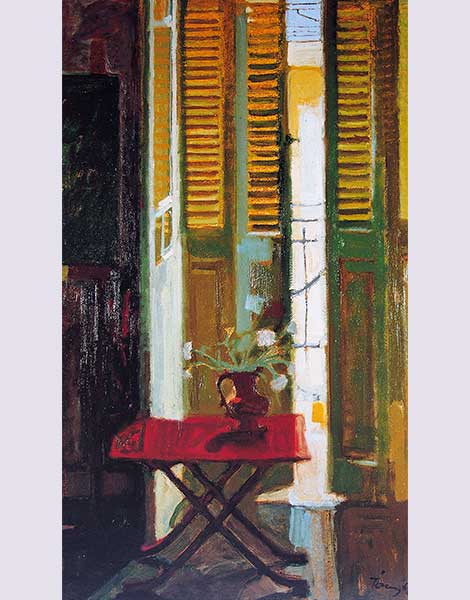
“Balcony Door,” 1961, oil on wood, 172x99cm, from the publication “National Gallery: 100 Years”
Panayiotis Tetsis (1925-2016) was an artist beloved by the Greek public, a painter who stayed faithful for most of his working life to representational art and to expressionism. In his work can be found a passion for Greek landscapes, for the Greek light and for the childlike curiosity he held for the world around him.
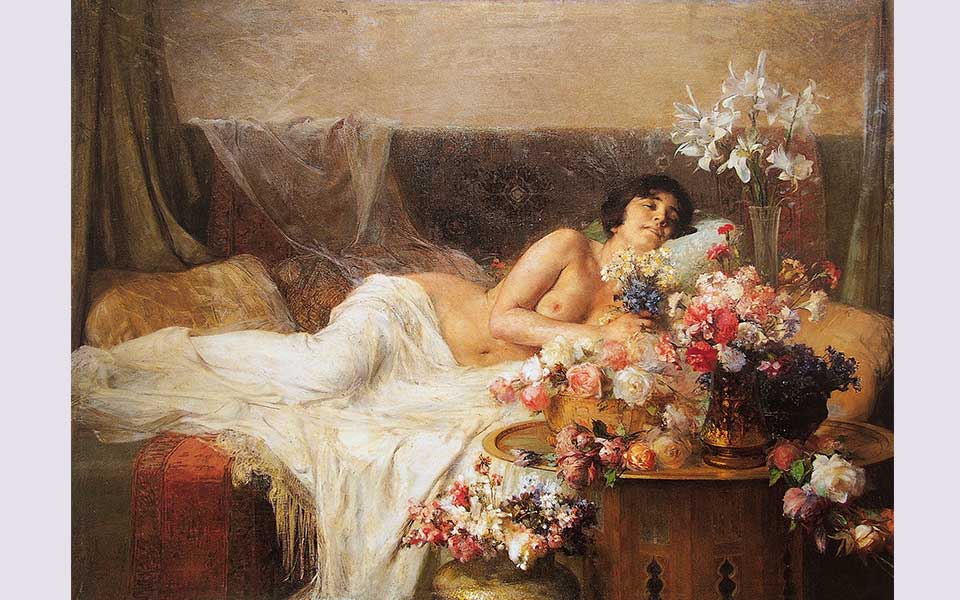
“Springtime,” 1927, oil on canvas, 120x168cm, from the publication “National Gallery: 100 Years”
Georgios Iakovidis (1853-1932) was one of the leading representatives of the Academic Art style in Greece. He served as the director of the Athens School of Fine Arts, where he also taught, and was the first curator of the National Gallery in Athens as well. In his work, he focused mainly on mythological themes and portraiture, as well as on still lifes featuring flowers.
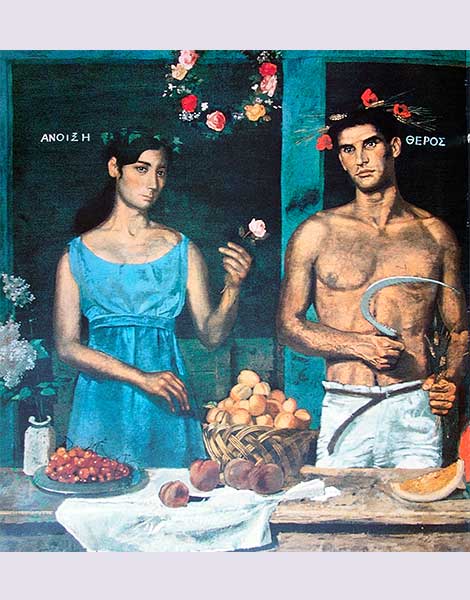
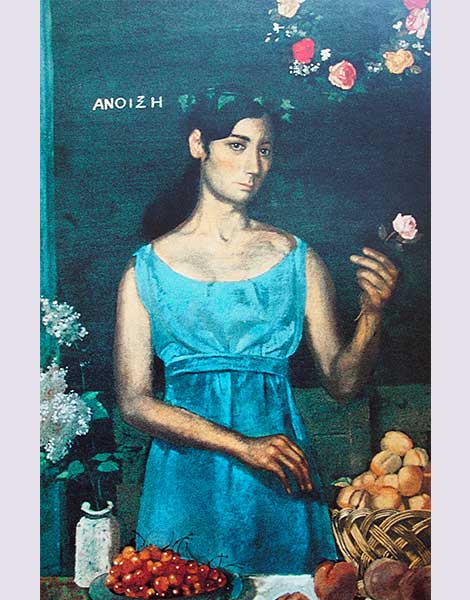
A detail from “The Four Seasons,” 1969, oil on canvas, 160x300cm, from the publication “Greek Art: Painting in the 20th Century,” Ekdothike Athenon
Yannis Tsarouchis (1910-1989), one of the most important figures in the art movement known as the Generation of the ’30s, combined elements of ancient Greek painting, Byzantine iconography and folk art to produce work that is still regarded today as ideally Greek.
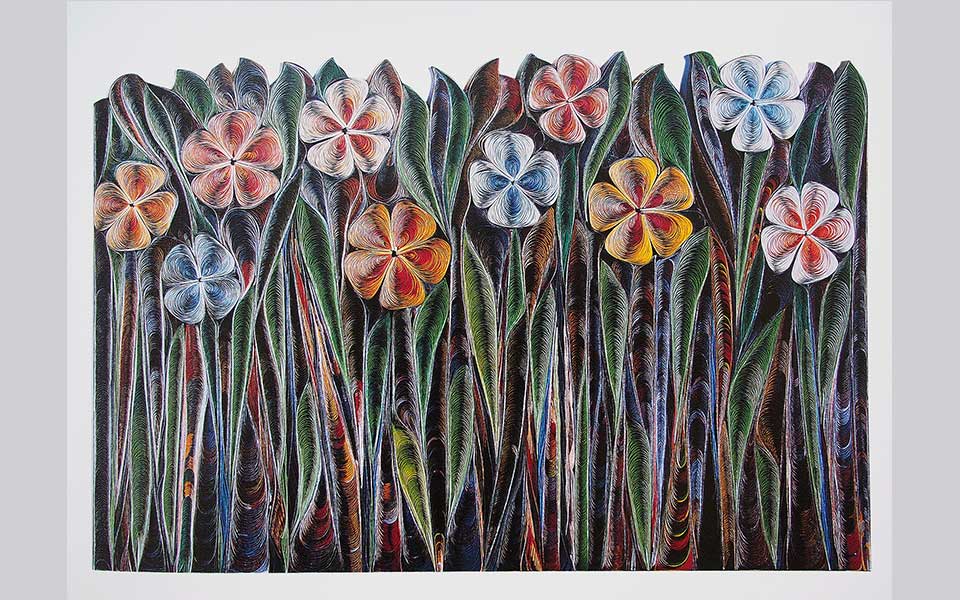
“Champs des fleurs,” 1991, poster paper, 165x243x6cm, from the publication “Pavlos,” The J.F. Kostopoulos Foundation and The Adam Foundation.
Pavlos Dionyssopoulos (1930-2019), known to the art world as Pavlos, belonged to both the Pop Art and Nouveau Realisme movements. He used strips cut from posters and colored paper to create playful works that represented everyday objects, plants and human figures.
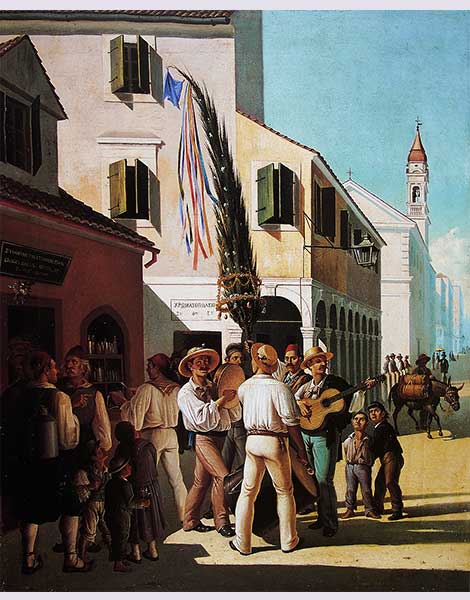
“May Day on Corfu,” c. 1875, oil on canvas, 61x51cm, from the publication “National Gallery: 100 Years”
Haralambos Pachis (1844-1891) was an artist from Corfu who painted genre scenes and landscapes, mixing elements of traditional folk art with the Italian influences prevalent on the island.
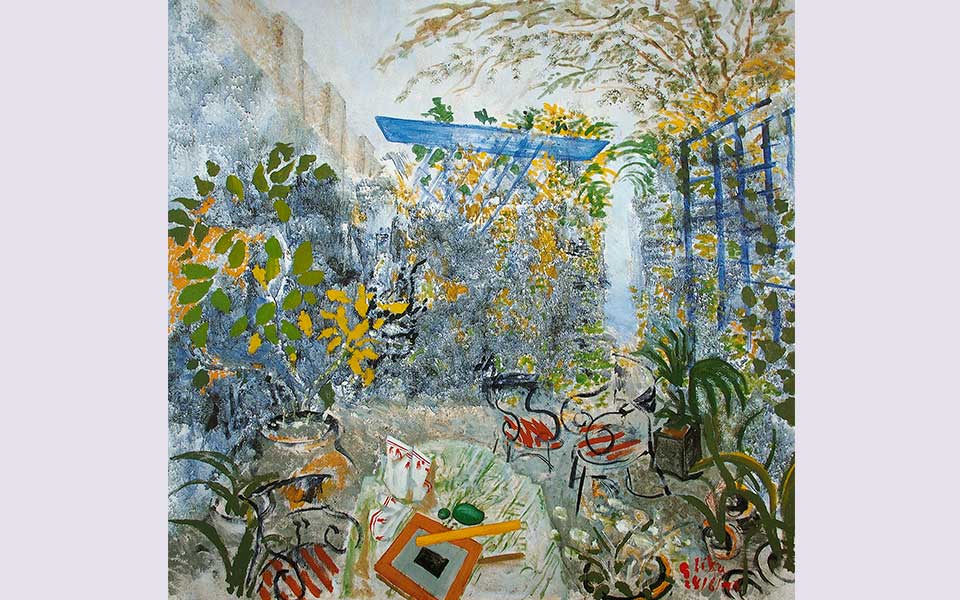
“Terrace on Kriezotou Street,” 1990, oil on canvas, 150x150cm, from the publication “Ghika,” Adam Editions
Nikos Hadjikyriakos-Ghikas (1906-1994), also known as Niko Ghika, was a worldly and intellectual artist who managed to combine elements of European Cubism and traditional Greek art to create his own personal idiom. Here he captures on canvas the verdant roof terrace of his house at 3 Kriezotou, today home to the Ghika Gallery of the Benaki Museum.
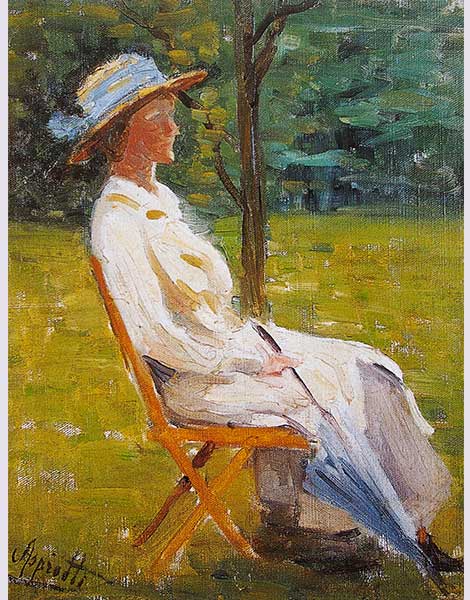
“In the Countryside,” sometime before 1930, oil on canvas, 46x38cm, from the publication “National Gallery: 100 Years”
Kleoniki Asprioti (1870-1938) was one of the few women in Greece able sustain a professional career as a painter in the early years of the 20th century, with notable exhibition activity elsewhere in Europe as well.
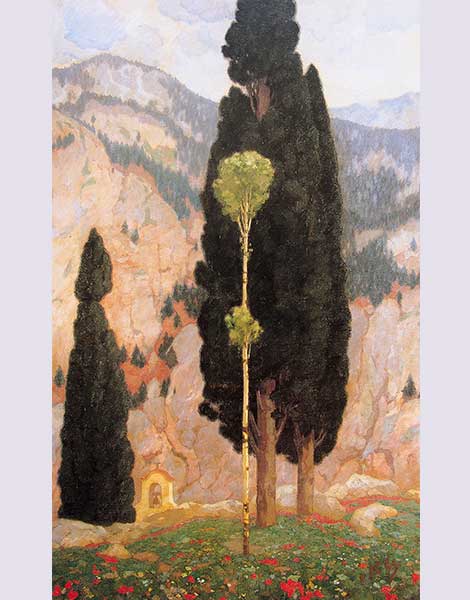
“Spring on Mount Oitis,” 1933, oil on canvas, 138x86cm, from the publication “National Gallery: 100 Years”
Nikolaos Othonaios (1877-1950) displays the characteristic beauty of the Greek countryside in springtime in this impressionist work. Poppies have always symbolized spring in Greek landscape art, as this is the season when they appear, but they also carry a deeper symbolic connection with Easter.
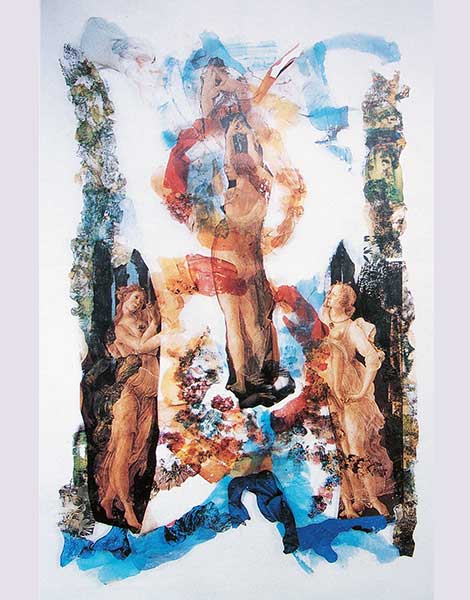
“Images,” 1982, décollage on plexiglass, 200x132cm, from the publication “Chryssa Romanos,” Editions Exandas
Chryssa Romanos (1931-2006) was, by the 1960s, working mainly with collages. In the 1980s, that focus had led her to develop her own technique of décollage in which she frequently worked with imagery from Renaissance paintings. Here we see a work based on Botticelli’s “Primavera”.
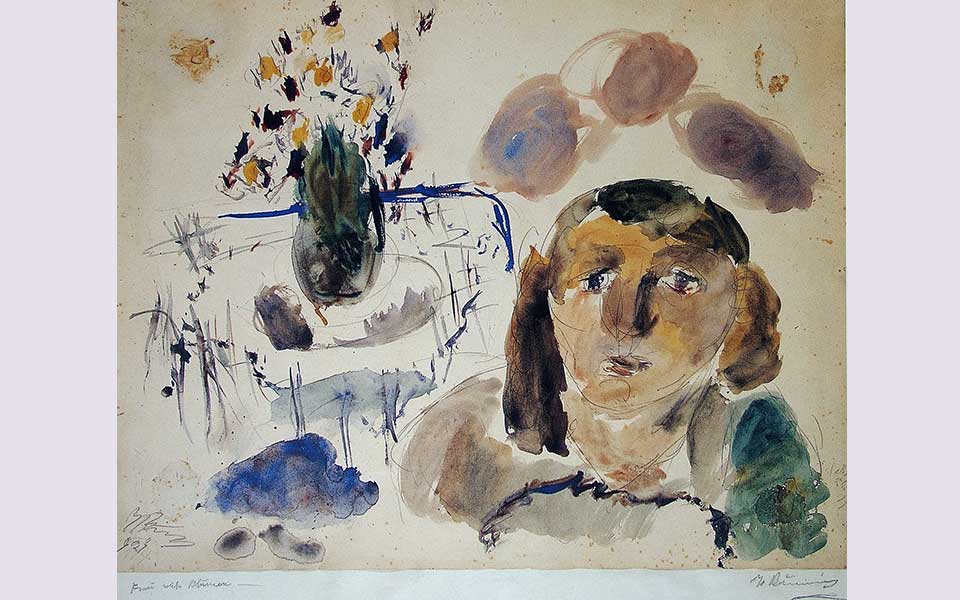
“Woman with Flowers,” 1923, watercolor on paper, 56x73cm, from the publication “National Gallery: 100 Years”
George Bouzianis (1885-1959) shaped the character of his art in Germany, where he lived and worked for many years. A member of the Neue Secession group, he was also the most important proponent of Expressionism in Greece.
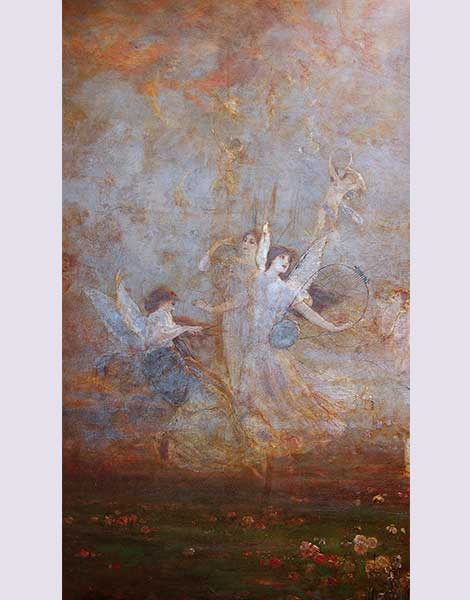
“Spring Symphony,” 1886, oil on canvas, 100x196cm, from the publication “National Gallery: 100 Years”
Nikolaos Gyzis (1842-1901) was one of the great figures in Greek painting; he spent most of his long, successful career in Munich. His later work is marked by the questioning nature that characterizes the pioneering Jugendstil movement.
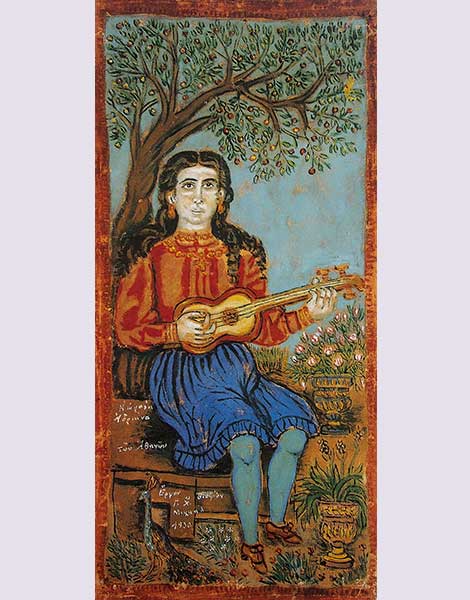
“The Beautiful Adriana of Athens,” 1930, oil on canvas, 92×43.5cm, from the publication “National Gallery: 100 Years”
Theophilos Hatzimihail (1873-1934), better known simply as Theophilos, was perhaps the most idiosyncratic self-taught artist in the history of Greek painting. Largely unheralded during his lifetime, he earned his living painting murals and signs for inns and coffee houses. His work displays all the innocence and exuberance of folk art.

